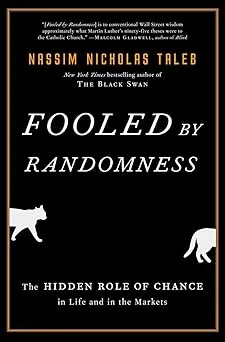About this book
Five Key Takeaways
- Chance significantly influences success and failure in life.
- Humans falsely seek patterns in random events.
- Survivorship bias skews our perception of success.
- Volatility is essential for assessing financial risk.
- Decisions require understanding and accepting uncertainty.
-
Chance Shapes Success More Than Skill
People often mistake random outcomes for personal skill in life and business. Hard work is frequently overcredited for successes shaped by luck.
For example, traders in financial markets might attribute profits to expertise rather than acknowledging the role of random market fluctuations (Chapter 1).
This misjudgment causes overconfidence, particularly in high-stakes environments, where decisions can heavily impact financial stability and outcomes.
Believing in skill over randomness can lead to recklessness, as individuals may pursue overly risky strategies, thinking they control their success.
The inability to acknowledge randomness blinds people to its role, promoting unrealistic expectations about repeatable success patterns.
Understanding that randomness profoundly influences results highlights the need for humility. It helps individuals make more cautious and informed choices.
This perspective encourages grounded expectations in life and business, fostering stability in a world filled with unpredictable outcomes.
Ultimately, recognizing luck’s role enables better preparation for uncertainty, leading to more sustainable approaches to decision-making (Chapter 1).
-
Resist Seeing Patterns in Randomness
In situations involving randomness, humans instinctively try to find patterns. This habit can distort judgment and decision-making.
Instead of interpreting random events as predictable trends, train your mind to question surface patterns before forming conclusions.
Challenge assumptions about causality when success is attributed to skill or strategy. Recognize the hidden role of chance in outcomes.
This critical shift helps correct biases, like superstitions or false confidence based on supposed ‘winning strategies’ (Chapter 2).
By resisting false patterns, you make more logical decisions, balancing emotional impulses with a thoughtful evaluation of risks.
This approach prepares you for uncertainty, preventing costly mistakes born of misinterpreted randomness in financial or personal decisions.
In the long-term, critical thinking leads to resilience, reducing susceptibility to being misled by false patterns or overconfidence.
-
Survivorship Bias Skews Success Stories
People focus on winners and ignore failures, making success seem simpler and more achievable than it really is.
This phenomenon, called survivorship bias, warps perceptions by dismissing the setbacks and failures that shaped the full landscape (Chapter 3).
For example, idolizing successful entrepreneurs often ignores the thousands of others who failed despite similar efforts or strategies.
This leads to flawed beliefs that duplicating a winner’s steps guarantees success, oversimplifying how randomness impacts outcomes.
Misjudging the balance of effort, timing, and luck inspires false confidence and unrealistic aspirations in individuals and businesses.
Considering the overlooked failures promotes a nuanced understanding, showing that randomness deems many efforts unsuccessful, despite their merit.
A comprehensive perspective that values both success and failure helps manage expectations and fosters a healthy relationship with risk.
Breaking free from survivorship bias improves decision-making by ensuring a realistic understanding of what success truly entails (Chapter 3).
-
Embrace Volatility to Manage Risks
Financial and life decisions occur in unpredictable environments. Fluctuations – or volatility – are inevitable parts of the process.
Instead of fearing volatility, learn to incorporate its presence into strategy. Treat unpredictability as a reality, not an anomaly.
Adopt adaptive planning techniques, preparing for unexpected market swings and embracing flexibility in decision-making habits.
Recognizing volatility expands your risk management toolkit. It shields you from emotional reactions and informs better crisis responses.
Long-term, embracing volatility fosters resilience during downturns, helping you avoid rash decisions influenced by sudden market changes.
Ultimately, this improves financial outcomes and builds emotional stability, key traits for navigating unpredictable terrain (Chapter 4).
-
Historical Data Can Mislead Investors
Reliance on past trends creates a false sense of predictability, leading investors to overestimate their ability to forecast outcomes.
Market conditions are shaped by randomness, and historical data often omits rare, impactful events known as “Black Swans” (Chapter 5).
This oversight results in unrealistic confidence among decision-makers, who may think history guarantees certain outcomes.
Such beliefs can lead to severe miscalculations, exposing individuals to avoidable financial risks and unnecessary volatility.
Taleb urges skepticism when using historical trends. Past behavior is an unreliable guide to future market movements.
Building strategies around flexibility and randomness awareness mitigates the dangers posed by too much dependence on historical data.
By broadening perspectives, this mindset prevents misjudgments and ensures stronger adaptability to life’s inevitable surprises.
-
Make Decisions With Uncertainty in Mind
Uncertainty colors every aspect of life, from investments to relationships. Ignoring it leads to rigid plans and future disappointments.
Instead of seeking absolute certainty, acknowledge unpredictability. Prepare flexible strategies with backup plans to adapt quickly when needed.
To get started, weigh potential risks and rewards realistically, balancing optimism with cautious pragmatism in every significant decision-making process.
This awareness mitigates biased judgments, promoting wiser, long-term choices that withstand life's volatile nature (Chapter 7).
It fosters preparedness, empowering you to respond confidently to surprises instead of being caught off-guard by unexpected results.
Ultimately, incorporating randomness minimizes emotional turmoil and helps ground strategies in reality, not just idealized expectations.
-
Trusting Experts Can Be Risky
Blind trust in experts can mislead individuals, particularly when advice simplifies or omits the role of randomness (Chapter 8).
Experts may exude confidence based on past results, ignoring chance, which risks reinforcing unrealistic beliefs about guaranteed successes.
Failing to question these perspectives overlooks deeper uncertainties and biases that cloud the accuracy of ‘expert’ assertions.
Overconfidence in expert opinions fosters complacency, masking the unpredictable nature of real-world complexities and decision risks.
Nassim Taleb encourages skepticism. Actively challenge experts’ conclusions and investigate the probability driving their claims.
Applying critical thinking unveils overlooked aspects of randomness, diversifies perspectives, and guards against reliance on unsupported advice.
This enhanced outlook builds self-reliance and empowers better financial and personal decisions in the face of life’s seeming certainties.




















